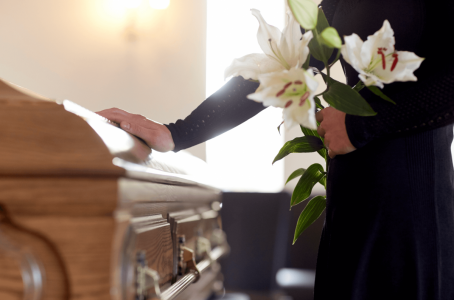SDC Rewards Member
Upgrade yours now
A
Money Matters: How to cope financially after a loved one passes away
No one likes to think about death. It's a scary and taboo subject for many of us, so it's no wonder that most people don't have an up-to-date will. In fact, studies show that over 60% of Australians don't have a will at all.
Not only is this bad news for our loved ones when we're gone, but it can also cause major financial stress – as one Seniors Discount Club member found out the hard way.
When her husband passed away unexpectedly, this pensioner was left with a lot of bills to pay and no idea how to access his accounts or cancel his services. Not only that, but she also had to contend with the high cost of funeral expenses – all while grieving the loss of her partner.
If you find yourself in a similar situation, don't worry – we're here to help. Here are some important financial tips to keep in mind following the death of a loved one:
Take stock of assets and investments
Usually, in the absence of any will, the assets previously shared by the deceased and their partner in joint names will be inherited by the latter. If the property was held as tenants in common, however, the deceased's share goes to the estate instead. However, if it was sold within two years of the death, it will be tax-exempt from capital gains.
You can read more about tenants in common here. Essentially:
When parties own property as joint tenants, this means that:
all joint tenants have equal ownership and interest in the property; and
a right of survivorship exists (ownership goes to the surviving party).
Tenants in common co-own a property in defined shares (e.g. 40/60) that they can dispose of as they wish. The shares owned by each tenant in common can be equal shares or unequal shares.
You can receive inheritances without paying a single cent of capital gains tax (CGT) if you and your partner owned property or joint bank accounts in joint names. However, if it was merely in the sole name of your partner, then these would be distributed according to the will.
The funeral
It's necessary to take a look at the total cost of the funeral when planning for the expenses after the loss of a loved one. Funeral costs can vary tremendously based on where you live and the type of service you select. So, it's important to shop around for estimates prior to making any decisions.
First - If your partner had a separate bank account, contact their bank using their account details and notify them of what has happened. They should be able to advise on what steps need to take next. The bank may release money from your partner's account in order to cover funeral expenses - this happens before probate is granted (before the court validates the will).
If joint accounts were involved then simply ask for these funds to be transferred into your own account.
Secondly - Check to see if your partner or loved one has prepaid their funeral. This is something you should ask your solicitor or the executor of the estate.
Thirdly - Speak to the Funeral Director about the possibility of paying in instalments. They are usually very understanding and accommodating.
Finally - You may also be eligible for bereavement payment through Centrelink. This may be a lump sum or a short-term payment.
It’s also worth noting that if your loved one was receiving veteran benefits, then you may be eligible for a once-off, non-taxable payment from the DVA.
Providing a proof of death certificate will be essential in order to organise any change in services, therefore, check first with the Funeral Director on the documentation necessary before making any decisions.
The will
Your partner may have left a will setting preferences for how the estate should be distributed, however, if no will exists then state laws determine how relatives will inherit from the estate. In some cases, you may be the executor.
This means you are responsible for distributing assets as per the wishes set out in the will.
Check your entitlements
If your partner had life insurance or other investments, contact the institution to find out how to receive payment. Some life insurance companies distribute benefits within forty-eight hours or so of being presented with a death certificate.
If you have been designated as a beneficiary of your partner's superannuation, check with the fund to see how to access this money.
You may also be entitled to financial aid from the Department of Human Services. For more information, visit the super death benefits on the Australian Taxation Office website. The Financial Services Council can help you find lost life insurance policies.
Inform service providers
It is important to inform service providers of your partner or loved one’s passing and update their identities on your accounts. Because the deceased's assets will be frozen until their estate settles, their bank accounts and other financial assets will be among the things that need to be passed down prior to your receiving your share.
If you have a joint account, you can access the funds. Under the right circumstances, you can access the assets on your partner's superannuation fund. The co-owner, with a death certificate, can nominate, their estate's bank account
Contact providers to transfer services into your name or cancel any you no longer need. For example, the following:
Bank and investment accounts
Phone, internet, streaming services
Utilities (electricity, gas, water)
Memberships and registrations
Email and social media
The Australian Death Notification Service lets you notify multiple agencies at once online. Before making changes, service providers may require you to provide a copy of the death certificate and proof of your identity,
After the loss of a partner or loved one, it is completely natural to feel like the world has come crashing down. But try to stay strong, lean on friends and family and take things like finances one step at a time.
If you are struggling during this time, assistance is available.
Lifeline offers free, non-judgemental crisis support 24/7 at 13 11 14.
You can also contact:
Australian Centre for Grief and Bereavement: 1800 642 066
Beyond Blue: 1300 22 46 36
Services Australia: 13 17 94
Parentline: 8 am to 12 midnight, 7 days a week, call 13 22 89.
MensLine Australia: 24 hours, 7 days. Call 1300 78 99 78.
Suicide Call Back Service: 24 hours, 7 days. Call 1300 659 467.
If you need to know more about grief, and to get advice on what to do next, you can also call healthdirect on 1800 022 222 to speak with a registered nurse, 24 hours, 7 days a week (known as NURSE-ON-CALL in Victoria).
Important financial considerations to talk about with your partner while you're both healthy
Members, the information above may not be relevant to you. If you are lucky enough to have your partner and loved ones with you, it’s best to be prepared and have these conversations now.
Here are some topics to discuss:
1. Funeral expenses: Who will be responsible for paying for the funeral? Do you have the funds available to cover the costs? Are there specific arrangements like cremation or burial which are preferred?
2. Outstanding debts: Do either of you have outstanding debts? Who will be responsible for paying off these debts?
3. Mortgage or rent: If you or your loved one is responsible for paying the mortgage or rent, you will need to make arrangements to continue making these payments.
4. Utilities: Who will be responsible for paying the utilities?
5. Insurance: Do you or your loved one have any life insurance? Who is the beneficiary of the policy?
6. Retirement: Do you or your loved one have any retirement savings? Who is the beneficiary of the account?
7. Investments: If you have investments, who is the beneficiary of the account?
8. Bank accounts: Do you have a joint account or are you listed as a beneficiary?
These are just a few considerations that will make a difficult time a little easier.
Do you have any further advice you would like to offer, members? While it is an awful thing to go through, your experience may help others in their time of need.
Westpac also has an informative video that you can watch below:






